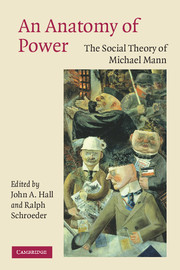Book contents
- Frontmatter
- Contents
- List of figures
- List of contributors
- 1 Introduction: the IEMP model and its critics
- Part I Theory, practice, method
- 2 Mann's transformation of the classic sociological traditions
- 3 Political questions
- 4 Mann's microfoundations: addressing neo-Weberian dilemmas
- 5 Grand, yet grounded: ontology, theory, and method in Michael Mann's historical sociology
- Part II Types of power
- Part III European exceptionalism?
- Part IV Promise and perils of modernity
- Part V Response
- Bibliography of Michael Mann's Writings
- Index
- References
2 - Mann's transformation of the classic sociological traditions
Published online by Cambridge University Press: 22 September 2009
- Frontmatter
- Contents
- List of figures
- List of contributors
- 1 Introduction: the IEMP model and its critics
- Part I Theory, practice, method
- 2 Mann's transformation of the classic sociological traditions
- 3 Political questions
- 4 Mann's microfoundations: addressing neo-Weberian dilemmas
- 5 Grand, yet grounded: ontology, theory, and method in Michael Mann's historical sociology
- Part II Types of power
- Part III European exceptionalism?
- Part IV Promise and perils of modernity
- Part V Response
- Bibliography of Michael Mann's Writings
- Index
- References
Summary
Michael Mann's ongoing work is as close to classic sociology for our own day as anything one can find. This is so in several senses. It has the scope of classic themes: the major conditions and processes which shape the relatively stable social structures of each historical period, and propel their changes. Mann's work is also classical in a sense that connects it with what we have come to see as the main stream of macro-sociology; he sets forth that which we have learned from Marx and Weber that is worth preserving, and displays the state of our knowledge on Marxian and Weberian themes. This is not to diminish the considerable originality which is found in Mann. A living classic contains a balance of what is old and what is new; it gives a sense of continuity from the great issues of the past and the concepts that frame them, and a sense of growing intellectual sophistication. Scholarship is a collective enterprise; much of what makes Mann's work a contemporary classic is his exemplary statement of lines of research that have been pursued by many scholars. But this is true of any great classic. Weber was selected out by his successors from a large and sophisticated scholarly community doing related work in what we would now call historical sociology; he too was a packager and crystallizer of the work of that larger community.
- Type
- Chapter
- Information
- An Anatomy of PowerThe Social Theory of Michael Mann, pp. 19 - 32Publisher: Cambridge University PressPrint publication year: 2006
References
- 7
- Cited by

